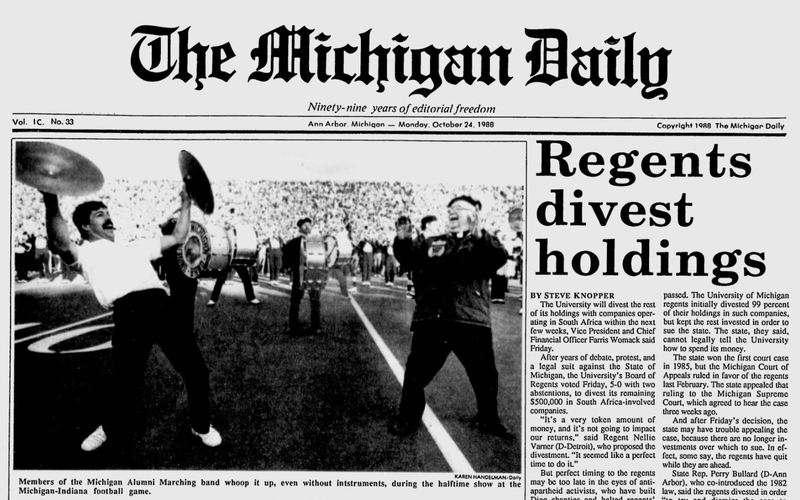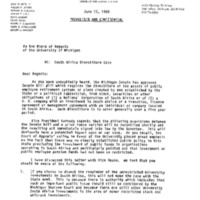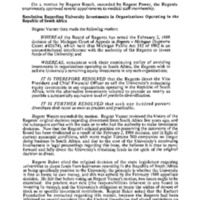Full Divestiture
Following the Regents’ decision to divest from 90% of their stocks in companies active in South Africa, anti-apartheid supporters at the University of Michigan remained unsatisfied. The Regents’ subsequent decision to protest the legality of the Michigan’s Public Act 512 began an extensive legal battle that lasted until 1988. After an August 1985 Ingham County Circuit Court ruling that upheld Public Act 512, further measures were taken to divest from companies associated with South Africa. Amid pressure from renewed protest on campus, the Regents voted in September 1985 do divest an additional $4.5 million of their portfolio associated with South Africa, leaving just $500,000. This remaining sum was necessary to continue the legal process with the state of Michigan over the University's autonomy.
Nationwide, however, Between 1983 and 1988, a new generation of activists pushed arguments for economic sanctions against South Africa into mainstream political consciousness, leading to action at the highest levels of government. Locally, the Ann Arbor Human Rights Commission passed a resolution compelling the City of Ann Arbor to divest from South Africa in February 1986. In September of 1986, Congress overrode President Reagan’s veto to make the Comprehensive Anti-Apartheid Act law, inserting economic sanctions against South Africa’s regime into official U.S. foreign policy.
These developments signalled a profound shift in institutional attitudes towards support for divestment. Though academic institutions continued to debate the merits and effectiveness of divestment, the number of universities that had fully divested continued to increase throughout the 1980s. Comparable institutions, such as the University of Wisconsin and Michigan State University, had already fully divested by 1980, but by the summer of 1986, the New York Times estimated that over 100 institutions had either partially, or fully divested their holdings in companies doing business in South Africa.
At the University of Michigan, however, full divestment would not arrive until October 1988. Though by that time only about $500,000 remained of the original $50 million sum, the Regents refused to divest the remaining funds until the appeal process against Public Act 512 was concluded. Nearing the summer of 1988, the Michigan Senate approved a resolution to disinvest the assets of the state's employee retirement system from entities engaged in South Africa. This made the University's argument that the state was hypocritical to require UofM to divest much weaker. However, communications between the Regents and legal counsel recommended that the University refrain from divesting until the process was resolved, or risk "psychological damage" in the case. Nevertheless, the Regents' claim that their only concern was maintaining the University's autonomy, seems supported by the final divestment of the $500,000 shortly after the Regents won the decision. Throuhgout, protest activities, such as shantytowns and support for Nelson Mandela’s honorary degree, continued on campus as a reminder of the racism at home and abroad.
Sources for this page:
The Michigan Daily, June 10, 1988.
Fiske, Edward B., "Universities Debate the Costs of Selling Investments Linked to South Africa," New York Times, May 18, 1986.
The Michigan Daily, September 23, 1985.
The Michigan Daily, October 24, 1988.




